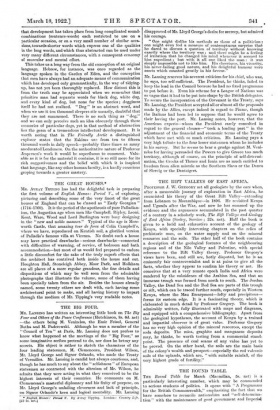THE BIG FOUR.
Mu. LANSING has written an interesting little book on The Big Four and Others of the Peace Conference (Hutchinson, 8s. 6d. net) —the others being M. Venizelos, the Emir Feisul, General Botha and M. Paderewski. Although he was a member of the "Council of Ten" at Paris, Mr. Lansing does not profess to know what happened at the meetings of the "Big Four," as some imaginative scribes pretend to do, nor does he betray any secrets. His object is rather to sketch the characters of the four leading statesmen, M. Clemenceau, President Wilson, Mr. Lloyd George and Signor Orlando, who made the Treaty of Versailles. Mr. Lansing is candid but always courteous, and, though he has much to say about the " selfishness " of European statesmen as contrasted with the altruism of Mr. Wilson, he admits that they were acting in what they conceived to be the highest interests of their countries. He comments on M. Clemeneeau's masterful diplomacy and his fixity of purpose, on Mr. Lloyd George's unfailing cleverness and lack of principle, on Signor Orlando's keen and logical mentality. Mr. Lansing
• English Home.: Period V. By Avray Tipping. London : Country Life.
L53 33. net.] disapproved of Mr. Lloyd George's desire for secrecy, but admired his courage.
"One might dislike his methods as those of a politician ; one might even feel a measure of contemptuous surprise that he dared to discuss a question of territory without knowing exactly where the territory was ; and there might be a feeling of irritation that he changed his mind whenever it seemed to him expedient ; but with it all one liked the man : it was simply impossible not to like him. His cheeriness, his vivacity, his never-failing good nature, and his delightful humour were assets which counted greatly in his favour.'
Mr. Lansing reserves his severest criticism for his chief, who was, he says, too self-sufficient. The President, he thinks, failed to keep the lead in the Council because he had no fixed programme to put before it. Even his scheme for a League of Nations was so vague that it had to be put into shape by the British delegates. To secure the incorporation of the Covenant in the Treaty, says Mr. Lansing, the President accepted all or almost all the proposals made by the Allies, except indeed in regard to Fiume, though the Italians had been led to suppose that he would agree to their having the port. Mr. Lansing notes, however, that the American experts—whom the President rarely consulted in regard to the general clauses—" took a leading part" in the adjustment of the financial and economic terms of the Treaty which have met with so much criticism. Mr. Lansing pays a very high tribute to the four lesser statesmen whom he includes in his survey. But he seems to bear a grudge against M. Veni- zelos for having persuaded the Powers to give Greece too much territory, although of course, on the principle of self-determi- nation, the Greeks of Thrace and Ionia are as much entitled to freedom from alien misrule as the Southern Slays or the Danes of Slesvig or the Dantzigers.


































 Previous page
Previous page